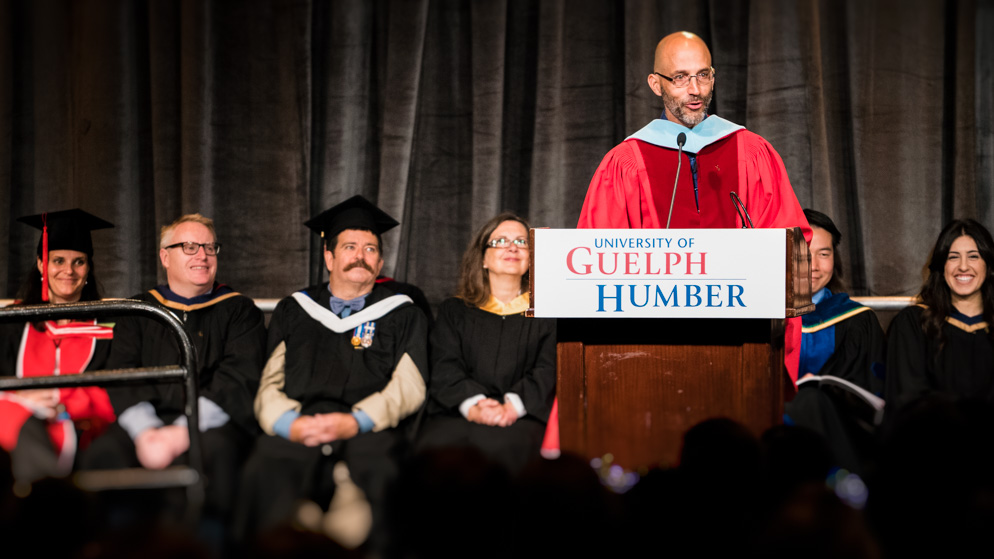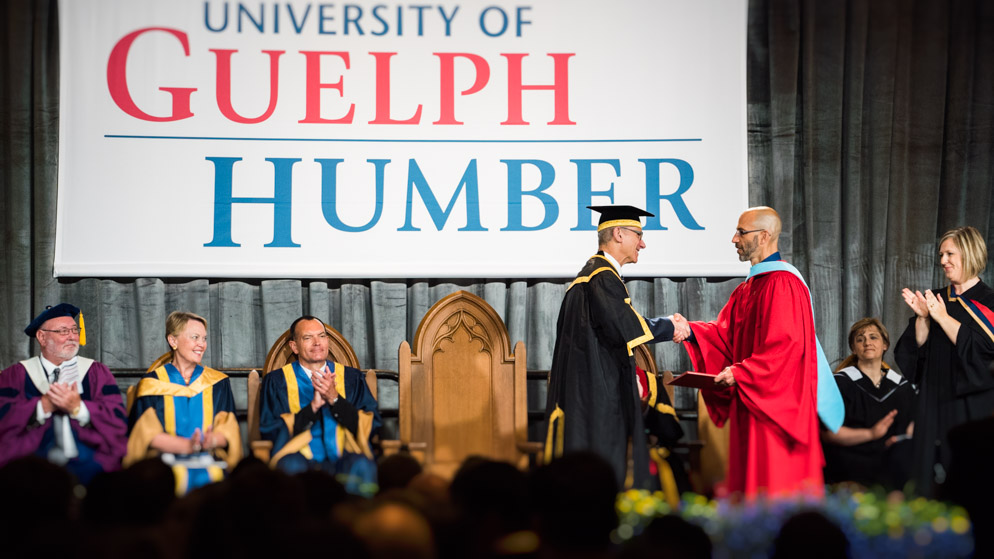

Canadian military veteran and mental health innovator gives convocation address following conferral of honorary degree
Widely recognized for his contributions toward tackling stigmatization of mental illness, it felt appropriate that Lieutenant-Colonel (Retired) Stéphane Grenier speak so unceremoniously of talk on the subject.
“We know that 1 in 5 suffer from a mental health problem. We’re told by Bell Canada every year; [Olympian and mental health advocate] Clara Hughes reminds us as she crosses Canada by bicycle [on her Big Ride for Mental Health as part of Bell’s Let’s Talk campaign]."
Grenier continues: “The cost of mental health, from a productivity perspective in Canada is $52-billion per year. So the time of speaking about mental health problems is gone. The time to act, is here.”
During Grenier’s 29 years with the Canadian military, he served in numerous overseas missions. “But then in 1994,” he says, “Rwanda became the beginning of the rest of my life.”
Upon his return from Rwanda, Grenier says he faced undiagnosed post-traumatic stress. “It completely absorbed my life for many, many years.” And would ultimately become the catalyst for his work today.
“We have dehumanized our systems, our organizations, through processes and forms and labour and grievances,” he says. He speaks with frustration about his experiences with policies, and with access to the clinical system. “How does a person with a broken brain, or a sprained brain, fit in our society?”
In 2001, Grenier coined the term “operational stress injury” and conceived, developed, implemented and managed a government-based national peer-support program for the Canadian military. This program, today, continues to provide peer support to Canadian Forces personnel, veterans, and families affected by mental health issues.
In 2007, he was appointed as the Operational Stress Injury Special Advisor to the Chief of Military Personnel. His work in creating a Canadian Forces workplace mental health education program led to the launch of a non-clinical mental health program. It delivers peer-based mental health education to more than 20,000 military personnel every year.
Since his retirement, Grenier has founded a charity and created Mental Health Innovations, a social enterprise dedicated to humanizing workplaces in Canada. He was awarded a Meritorious Service Cross by the Governor General of Canada and received a Champion of Mental Health award for his work in the field.
“I think we’ve managed to react to the epidemic that mental health is in Canada. But reacting is no longer enough. I do believe Canada is in a bit of a stalemate, where we’re trying to be innovative. But my generation can’t be as creative as yours,” he says to the crowd of graduands.
“You folks are the leaders who will take our work and move it. Move it forward, and break through the current stalemate. I ask that as you move into leadership positions, you not forget the simplicity of a conversation and of caring for one another.”
“You folks, in this room, locking arms together for the generations to come, can really break through, innovate, and change things for our great country.”

In recognition of his significant contributions to positive organizational and attitudinal changes regarding mental health within the Canadian military, and for his outstanding contributions to the field of mental health in Canada, Stéphane Grenier was conferred the degree of Doctor of Laws, honoris causa, at the University of Guelph-Humber’s convocation ceremonies held June 15, 2015.

